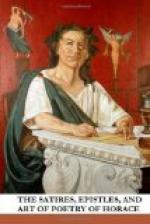“Of all the hellebore that nature breeds,
The largest share by far the miser needs:
In fact, I know not but Anticyra’s juice
Was all intended for his single use.
When old Staberius died, his heirs engraved
Upon his monument the sum he’d saved:
For, had they failed to do it, they were tied
A hundred pair of fencers to provide,
A feast at Arrius’ pleasure, not too cheap,
And corn, as much as Afric’s farmers reap.
‘I may be right, I may be wrong,’ said
he,
’Who cares? ‘tis not for you to lecture
me.’
Well, one who knew Staberius would suppose
He was a man that looked beyond his nose:
Why did he wish, then, that his funeral stone
Should make the sum he left behind him known?
Why, while he lived, he dreaded nothing more
Than that great sin, the sin of being poor,
And, had he left one farthing less in purse,
The man, as man, had thought himself the worse:
For all things human and divine, renown,
Honour, and worth at money’s shrine bow down:
And he who has made money, fool or knave,
Becomes that moment noble, just, and brave.
A sage, you ask me? yes, a sage, a king,
Whate’er he chooses; briefly, everything.
So good Staberius hoped each extra pound
His virtue saved would to his praise redound.
Now look at Aristippus, who, in haste
To make his journey through the Libyan waste,
Bade the stout slaves who bore his treasure throw
Their load away, because it made them slow.
Which was more mad? Excuse me: ’twill
not do
To shut one question up by opening two.
“If one buys fiddles, hoards them up when bought,
Though music’s study ne’er engaged his
thought,
One lasts and awls, unversed in cobbler’s craft,
One sails for ships, not knowing fore from aft,
You’d call them mad: but tell me, if you
please,
How that man’s case is different from these,
Who, as he gets it, stows away his gain,
And thinks to touch a farthing were profane?
Yet if a man beside a huge corn-heap
Lies watching with a cudgel, ne’er asleep,
And dares not touch one grain, but makes his meat
Of bitter leaves, as though he found them sweet:
If, with a thousand wine-casks—call the
hoard
A million rather—in his cellars stored,
He drinks sharp vinegar: nay, if, when nigh
A century old, on straw he yet will lie,
While in his chest rich coverlets, the prey
Of moth and canker, moulder and decay,
Few men can see much madness in his whim,
Because the mass of mortals ail like him.
“O heaven-abandoned wretch! is all this care
To save your stores for some degenerate heir,
A son, or e’en a freedman, who will pour
All down his throttle, ere a year is o’er?
You fear to come to want yourself, you say?
Come, calculate how small the loss per day,
If henceforth to your cabbage you allow
And your own head the oil you grudge them now.




